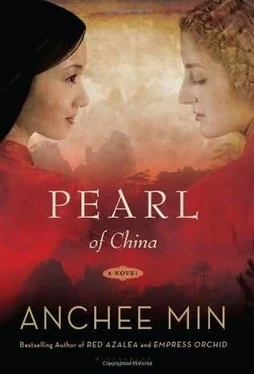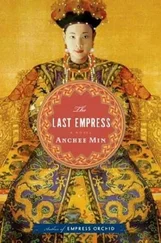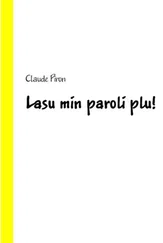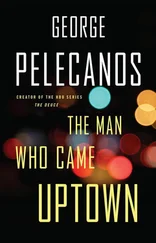It bothered me when Dick told our ten-year-old daughter that Communists and Christians were enemies.
“Not all Christians believe that China is evil until it accepts God,” I argued. “Pearl Buck, for instance. She is a Christian and she criticizes Christianity’s worst practices.” To prove my point, I read an essay Pearl had published in Southeast Asia Missionary Magazine a few years earlier. In this essay, Pearl pointed out that she had seen missionaries lacking in sympathy for the local people: “So scornful of any civilization except their own, so harsh in their judgments upon one another, so coarse and insensitive among a sensitive and cultivated people that my heart has fairly bled with shame.”
Dick was surprised. “Absalom’s daughter wrote that?”
I nodded.
“That’s unexpected,” he admitted.
“If only Mao could be more open-minded…”
Dick interrupted me and whispered, “My darling wife, you are not in Shanghai or Nanking. Remember, I have rivals. Jealous hearts do murder. Remember your Shakespeare?”
Dick believed that Mao would be more relaxed and allow more freedom when he became sure of his power.
“For now we must unite as one to survive.” Dick turned to Rouge. “No more criticism of the Communist Party, because it will be considered disloyal and a betrayal.”
Rouge’s eyes widened. She nodded seriously. “Baba is right and Mama is wrong,” she said.
“What about your name, Dick?” I challenged. “It definitely doesn’t sound proletarian!”
“My comrades know that Dick is my work name.” My husband smiled.
“What do you mean, work name? Do you have another name?”
“Yes.”
I laughed. “Why don’t I know it? After all, I am your wife.”
“Such is the life of a Communist.” Dick extended his arms and rocked his head from side to side, stretching his neck.
“What is your real name, Baba?” Rouge asked curiously.
“Well, we call it the work name or the current name.”
“So, what is your current name?” I asked.
“Well, it is Xinhua.”
“Xinhua? New China?” I laughed. “I think Old China would fit you better. You come from a background of scholars, landowners, and Capitalists! You studied Shakespeare and Confucius in college! Old China is in your blood! You have Western friends and you speak English!”
“No comment.” Dick was embarrassed.
From the few letters that reached me, I learned that Pearl had settled into a life of sorts in America. Although the United States was in a financial depression, she published and her books sold well. In 1932, she had won the Pulitzer Prize for The Good Earth while still among us. In 1938, she won the Nobel Prize for literature. In her letters, she mentioned her new awards casually. Her tone was no different than when she told me how she admired the American plumbing system, and she never explained how important the awards were. It wasn’t until many years later that I discovered that Pearl had become an international celebrity. The subject Pearl asked about most was Rouge. She wanted to know what my daughter’s life was like and if she had friends. She said that she had never realized how fortunate we had been to have each other as childhood playmates.
I wanted so badly to talk to Pearl about my daughter, but I didn’t want to remind her of what she didn’t have with Carol. Instead, I asked Pearl about her writing methods. She replied that her trick was to think like a Chinese farmer. “Before planting, the farmer already knew what, where, and how much to grow, the budget for seeds, fertilizer, animals, and field hands,” she wrote. “In other words, I try to make the best use of my material.”
About her daughter, Pearl reported that American doctors confirmed Carol’s early diagnosis that she would never have a chance to lead a normal life. There was nothing new in this news, but Pearl still sounded devastated. “The conclusion took away any happiness I would have felt in my accomplishments,” she wrote.
She did gain some comfort knowing that the income from her writing enabled her to provide permanent care for Carol. “Since Carol loves music, I made sure that the cottage, which my money helped build, was equipped with a phonograph and a collection of records,” she continued.
She talked about the farmhouse she had bought in Pennsylvania. “It is gigantic by Chinese standards!” she wrote. “I have been renovating the place so that I can adopt more children.”
Pearl and I still talked about Hsu Chih-mo. She let me know that she had finally been able to grieve and move on. “A new man has appeared on the horizon of my lonely love life,” she reported. “But I can’t do anything until my divorce with Lossing is finalized.”
The new man was her editor and publisher, Richard Walsh. Pearl was proud of the fact that they were best friends before they were lovers.
I was so happy for her and wrote to congratulate her. In my letter, I complained about Dick and the Red Base.
To my shock, the letter was intercepted by Communist intelligence agents. It got Dick in trouble.
“I have warned you!” Dick hissed at me. “We Communists don’t trust the Americans! Our enemy is supported by the Americans! Why is it so difficult for you to remember that? Yenan’s security is about Mao’s survival!”
In the past Dick had discouraged me from writing to Pearl. Now I was ordered to stop.
I refused to sign the Communist membership application Dick put in front of me. No matter how many times Dick explained the benefits and the necessity, I wouldn’t pick up the pen.
Finally, after months of struggle, I agreed to sign. I did so out of loyalty to my husband. Without my being a member of the Communist Party, Dick would never gain Mao’s full trust.
My biggest problem was following the Communist Party’s rules. I seemed to always say the wrong thing at the wrong time. I would praise the wrong people and criticize the right ones. For example, I remarked that I felt sorry for high-ranking heroes because they had achieved their rank only by killing a great number of people. I also said that all war was wrong. Because of these mistakes, I was ordered to criticize myself in public.
Dick was demoted as a result. His temper was no longer containable. Instead of fighting with me, Dick exploded at work. He applied for a transfer to be nearer the fighting. He was eager to join the battles. He wanted to be the first to engage the enemy and the last to retreat. The irony was that it turned out to be good for his career. He earned medals and promotions. His courage earned him the respect of the Communist leadership. He was restored to his former job. Mao welcomed Dick back and praised him as “the Red Prince.”
“Does that mean that Mao is the Red Emperor?” I joked the moment Dick entered the cave.
Dick didn’t find my comment funny, and warned me not to say such things again.
My life, as a fortune-teller had once predicted, was about the constant turning of feng shui, meaning that my fortunes were always changing. My future as a Communist would soon prove the fortune- teller’s wisdom. I had never imagined that there would be a benefit to claiming my background as a beggar. For the family background section in the party’s membership application, I truthfully wrote “Beggars.” This qualified Papa as a proletarian, and that included Rouge and me. If my grandfather hadn’t lost all his money, my father would have inherited his land and become the enemy of the Communists. I would have been denounced and perhaps shot as a spy.
The strain between Dick and me had much to do with the innocent souls Mao murdered at the Red Base. It happened before my eyes. People were arrested in broad daylight, sent away, and disappeared for good. These were young people, former college students. They were independent thinkers-people whom Dick had personally recruited. They had joined Mao to fight the Japanese. Overnight they were labeled as enemies, arrested, denounced, and murdered.
Читать дальше












